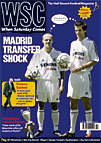 Corruption scandals in the domestic game are overshadowing the national team's fine form, writes Sam Beckwith, our man in a car park with an envelope of cash
Corruption scandals in the domestic game are overshadowing the national team's fine form, writes Sam Beckwith, our man in a car park with an envelope of cash
Euro 2004 aside, it’s a depressing time to be a Czech football fan. Away from the bright lights and big names of the national team, a year of bribery scandals has offered a shocking glimpse of just how corrupt the domestic game might be, with clubs that don’t bribe officials seemingly the exception rather than the rule.
Ironically, corrupt refereeing, which has a rich and colourful tradition here, was beginning to look like a thing of the past. The country’s richest team, Sparta Praha (Prague), no longer scored quite so many last-minute penalties or stoppage-time winners. Perhaps as a result, the league title seemed to be being shared around a little more, going to provincial sides Slovan Liberec in 2002 and Banik Ostrava last season. For big games, the Czech Football Association (CMFS) had even taken the radical step of bringing in officials from Slovakia, free from the taint of favouritism. But just when the tide of innuendo and persistent but impossible-to-prove allegations seemed to be receding, a wave of sleaze ripped through the game in the spring.
In March, a local paper reported that police had videotaped two Viktoria Plzen players receiving money from a Banik Ostrava official in a cafe said to be popular with drug dealers. That scandal died when Plzen police denied the tape existed, but in April an assistant referee was banned for life and a referee banned until the end of the season over suspicions that they had fixed a game between Sparta and another Prague team, Viktoria Zizkov, which Sparta won 3-1.
But the biggest shock came when machine-gun-wielding plain-clothes police officers apprehended Jaroslav Hastik, a director of FC Synot, at a remote petrol station in Vyskov, near Brno, the country’s second city, meeting assistant referee Stanislav Hruska.
Somewhat improbably, Hastik, who was carrying 175,000 crowns (£3,700) in bank notes, claimed that he needed to carry cash in such large amounts because he didn’t have a credit card. Presumably, then, the fact that Hruska had run the line at Synot’s 2-0 win over Sparta the previous month, was mere coincidence. The police, who had already videotaped Hastik handing 120,000 crowns to a referee in an underground car park in Prague, clearly thought otherwise.
Until the Vyskov incident, very little had been made of the fact that Synot, an ambitious club based in the south Moravian town of Uherske Hradiste, was part of a larger group of equally ambitious companies that also included a chain of betting shops. After the fact, it suddenly seemed like an open window to match-fixing. As further allegations involving Synot surfaced, team owner Ivo Valenta withdrew the club from this season’s Intertoto Cup and placed them up for sale.
Valenta and Hastik were fined 100,000 crowns each and banned from football for two years, though still protest their innocence. The club itself, renamed Slovacko, was fined 500,000 crowns and docked 12 points at the start of the new season, only avoiding forced demotion because there was no evidence that the team’s coaching or playing staff had been involved.
Since then, it’s been hard to keep up with the new allegations. The press, quoting police sources, reported that as many as 14 of the 16 first division teams were involved in corruption of some sort.
The national team’s often spectacular displays in Portugal provided a welcome break, but by July 30, with a new league season looming, further charges were made. This time, Viktoria Zizkov were alleged to have – unsuccessfully – attempted to bribe their way out of the relegation zone. Along with 15 referees and a refereeing supervisor, Zizkov’s flamboyant sporting director, Ivan Hornik, was also charged. Most shockingly, assistant referee Evzen Amler, a seemingly untouchable veteran of two World Cups, is also implicated.
By the start of the season 27 officials had been charged, most of them referees, leading to genuine concerns that the CMFS wouldn’t have enough experienced refs to cover first and second division games. Ultimately, despite talk of shipping in officials from Austria and Germany, the season kicked off with eight new referees.
Before the latest scandals, officials and pundits had been voicing concern over growing public apathy towards the domestic league, especially given the stark contrast offered by the popular and undeniably more glamorous national side. With further charges seemingly just around the corner and legal proceedings against those already embroiled in this fiasco on the horizon, that contrast is only likely to grow sharper.
From WSC 212 October 2004. What was happening this month